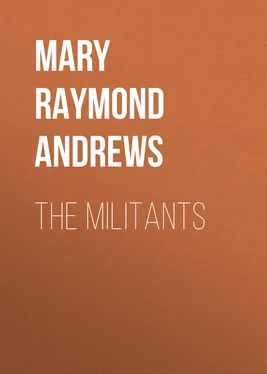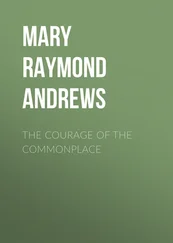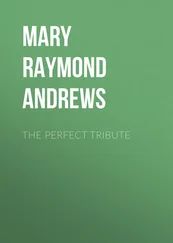Mary Raymond Shipman Andrews - The Militants
Здесь есть возможность читать онлайн «Mary Raymond Shipman Andrews - The Militants» — ознакомительный отрывок электронной книги совершенно бесплатно, а после прочтения отрывка купить полную версию. В некоторых случаях можно слушать аудио, скачать через торрент в формате fb2 и присутствует краткое содержание. Жанр: foreign_prose, foreign_antique, на английском языке. Описание произведения, (предисловие) а так же отзывы посетителей доступны на портале библиотеки ЛибКат.
- Название:The Militants
- Автор:
- Жанр:
- Год:неизвестен
- ISBN:нет данных
- Рейтинг книги:5 / 5. Голосов: 1
-
Избранное:Добавить в избранное
- Отзывы:
-
Ваша оценка:
- 100
- 1
- 2
- 3
- 4
- 5
The Militants: краткое содержание, описание и аннотация
Предлагаем к чтению аннотацию, описание, краткое содержание или предисловие (зависит от того, что написал сам автор книги «The Militants»). Если вы не нашли необходимую информацию о книге — напишите в комментариях, мы постараемся отыскать её.
The Militants — читать онлайн ознакомительный отрывок
Ниже представлен текст книги, разбитый по страницам. Система сохранения места последней прочитанной страницы, позволяет с удобством читать онлайн бесплатно книгу «The Militants», без необходимости каждый раз заново искать на чём Вы остановились. Поставьте закладку, и сможете в любой момент перейти на страницу, на которой закончили чтение.
Интервал:
Закладка:
The light of renunciation, the exhaustion of wrenching effort, the trembling triumph of hard-won victory, were in the boy's face, and the thought, as he looked at it, dear and familiar in every shadow, that he had never seen spirit shine through clay more transparently. Never in their lives had the two been as close, never had the son so unveiled his soul before. And, as he had said, in all probability never would it be again. To the depth where they stood words could not reach, and again for minutes, only the friendly undertone of the crackling fire stirred the silence of the great room. The sound brought steadiness to the two who sat there, the old hand on the young shoulder yet. After a time, the older man's low and strong tones, a little uneven, a little hard with the effort to be commonplace, which is the first readjustment from deep feeling, seemed to catch the music of the homely accompaniment of the fire.
"It is a queer thing, Ted," he said, "but once, when I was not much older than you, just such an unexpected chance influence made a crisis in my life. I was crossing to England with the deliberate intention of doing something which I knew was wrong. I thought it meant happiness, but I know now it would have meant misery. On the boat was a young clergyman of about my own age making his first, very likely his only, trip abroad. I was thrown with him—we sat next each other at table, and our cabins faced—and something in the man attracted me, a quality such as you speak of in this other, of pure and uncommon goodness. He was much the same sort as your old man, I fancy, not particularly winning, rather narrow, rather limited in brains and in advantages, with a natural distrust of progress and breadth. We talked together often, and one day, I saw, by accident, into the depths of his soul, and knew what he had sacrificed to become a clergyman—it was what meant to him happiness and advancement in life. It had been a desperate effort, that was plain, but it was plain, too, that from the moment he saw what he thought was the right, there had been no hesitation in his mind. And I, with all my wider mental training, my greater breadth—as I looked at it—was going, with my eyes open, to do a wrong because I wished to do it. You and I must be built something alike, Ted, for a touch in the right spot seems to penetrate to the core of us—the one and the other. This man's simple and intense flame of right living, right doing, all unconsciously to himself, burned into me, and all that I had planned to do seemed scorched in that fire—turned to ashes and bitterness. Of course it was not so simple as it sounds. I went through a great deal. But the steady influence for good was beside me through that long passage—we were two weeks—the stronger because it was unconscious, the stronger, I think, too, that it rested on no intellectual basis, but was wholly and purely spiritual—as the confidence of a child might hold a man to his duty where the arguments of a sophist would have no effect. As I say, I went through a great deal. My mind was a battle-field for the powers of good and evil during those two weeks, but the man who was leading the forces of the right never knew it. The outcome was that as soon as I landed I took my passage back on the next boat, which sailed at once. Within a year, within a month almost, I knew that the decision I made then was a turning-point, that to have done otherwise would have meant ruin in more than one way. I tremble now to think how close I was to shipwreck. All that I am, all that I have, I owe more or less directly to that man's unknown influence. The measure of a life is its service. Much opportunity for that, much power has been in my hands, and I have tried to hold it humbly and reverently, remembering that time. I have thought of myself many times us merely the instrument, fitted to its special use, of that consecrated soul."
The voice stopped, and the boy, his wide, shining eyes fixed on his father's face, drew a long breath. In a moment he spoke, and the father knew, as well as if he had said it, how little of his feeling he could put into words.
"It makes you shiver, doesn't it," he said, "to think what effect you may be having on people, and never know it? Both you and I, father—our lives changed, saved—by the influence of two strangers, who hadn't the least idea what they were doing. It frightens you."
"I think it makes you know," said the older man, slowly, "that not your least thought is unimportant; that the radiance of your character shines for good or evil where you go. Our thoughts, our influences, are like birds that fly from us as we walk along the road; one by one, we open our hands and loose them, and they are gone and forgotten, but surely there will be a day when they will come back on white wings or dark like a cloud of witnesses—"
The man stopped, his voice died away softly, and he stared into the blaze with solemn eyes, as if he saw a vision. The boy, suddenly aware again of the strong hand on his shoulder, leaned against it lovingly, and the fire, talking unconcernedly on, was for a long time the only sound in the warmth and stillness and luxury of the great room which held two souls at peace.
At that hour, with the volume of Browne under his outstretched hand, his thin gray hair resting against the worn cloth of the chair, in the bare little study, the old clergyman slept. And as he slept, a wonderful dream came to him. He thought that he had gone from this familiar, hard world, and stood, in his old clothes, with his old discouraged soul, in the light of the infinitely glorious Presence, where he must surely stand at last. And the question was asked him, wordlessly, solemnly:
"Child of mine, what have you made of the life given you?" And he looked down humbly at his shabby self, and answered:
"Lord, nothing. My life is a failure. I worked all day in God's garden, and my plants were twisted and my roses never bloomed. For all my fighting, the weeds grew thicker. I could not learn to make the good things grow, I tried to work rightly, Lord, my Master, but I must have done it all wrong."
And as he stood sorrowful, with no harvest sheaves to offer as witnesses for his toiling, suddenly back of him he heard a marvellous, many-toned, soft whirring, as of innumerable light wings, and over his head flew a countless crowd of silver-white birds, and floated in the air beyond. And as he gazed, surprised, at their loveliness, without speech again it was said to him:
"My child, these are your witnesses. These are the thoughts and the influences which have gone from your mind to other minds through the years of your life." And they were all pure white.
And it was borne in upon him, as if a bandage had been lifted from his eyes, that character was what mattered in the great end; that success, riches, environment, intellect, even, were but the tools the master gave into his servants' hands, and that the honesty of the work was all they must answer for. And again he lifted his eyes to the hovering white birds, and with a great thrill of joy it came to him that he had his offering, too, he had this lovely multitude for a gift to the Master; and, as if the thought had clothed him with glory, he saw his poor black clothes suddenly transfigured to shining garments, and, with a shock, he felt the rush of a long-forgotten feeling, the feeling of youth and strength, beating in a warm glow through his veins. With a sigh of deep happiness, the old man awoke.
A log had fallen, and turning as it fell, the new surface had caught life from the half-dead ashes, and had blazed up brightly, and the warmth was penetrating gratefully through him. The old clergyman smiled, and held his thin hands to the flame as he gazed into the fire, but the wonder and awe of his dream were in his eyes.
"My beautiful white birds!" he said, aloud, but softly. "Mine! They were out of sight, but they were there all the time. Surely the dream was sent from Heaven—surely the Lord means me to believe that my life has been of service after all." And as he still gazed, with rapt face, into his study fire, he whispered: "Angels came and ministered unto him."
Читать дальшеИнтервал:
Закладка:
Похожие книги на «The Militants»
Представляем Вашему вниманию похожие книги на «The Militants» списком для выбора. Мы отобрали схожую по названию и смыслу литературу в надежде предоставить читателям больше вариантов отыскать новые, интересные, ещё непрочитанные произведения.
Обсуждение, отзывы о книге «The Militants» и просто собственные мнения читателей. Оставьте ваши комментарии, напишите, что Вы думаете о произведении, его смысле или главных героях. Укажите что конкретно понравилось, а что нет, и почему Вы так считаете.












